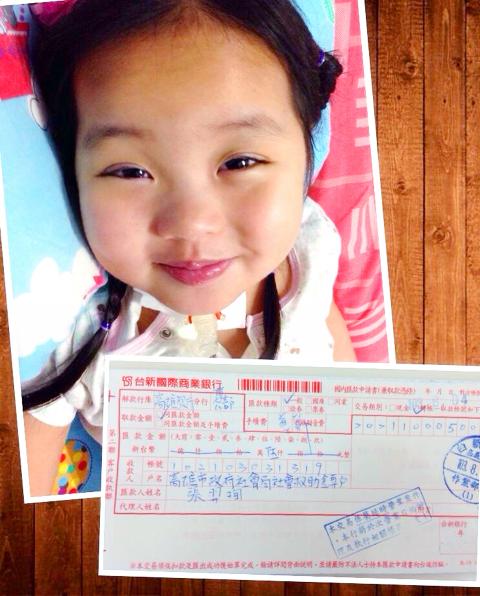The Ministry of Culture, media outlets and more than 100 poets and writers have launched a poetry drive to honor the victims of the Greater Kaohsiung gas pipeline explosions and their families in the hope of providing the survivors with comfort.
Poems about the Kaohsiung blasts have been posted on the Facebook page of the ministry’s Qidong Poetry Salon since Monday.
The salon site was launched on Thursday last week to help promote and preserve Taiwanese poetry.

Photo: Courtesy of Hsun Hsun’s family
“Suffering makes us appreciate each other more. Let us use poetry to pray for our fellow citizens who are in tears,” a statement on the salon’s page reads.
So far, more than 25 poems about the disaster have been posted, including ones written by poets Kuan Kuan (管管) and Chiang Hsun (蔣勳).
Minister of Culture Lung Ying-tai (龍應台), herself a renowned essayist and cultural critic, has contributed a poem titled Ruguo Zao Zhidao (如果早知道 , “If I Had Known Earlier”).
“If I had known earlier that the sight of you going out in a hurry tonight means that you would linger out of my reach this life, dear, oh how I would fall to my knees and kiss every inch of the soil you’ve stepped over,” the poem reads.
The explosions on Thursday night last week killed 30 people and injured 310.

A preclearance service to facilitate entry for people traveling to select airports in Japan would be available from Thursday next week to Feb. 25 at Taiwan Taoyuan International Airport, Taoyuan International Airport Corp (TIAC) said on Tuesday. The service was first made available to Taiwanese travelers throughout the winter vacation of 2024 and during the Lunar New Year holiday. In addition to flights to the Japanese cities of Hakodate, Asahikawa, Akita, Sendai, Niigata, Okayama, Takamatsu, Kumamoto and Kagoshima, the service would be available to travelers to Kobe and Oita. The service can be accessed by passengers of 15 flight routes operated by

Alain Robert, known as the "French Spider-Man," praised Alex Honnold as exceptionally well-prepared after the US climber completed a free solo ascent of Taipei 101 yesterday. Robert said Honnold's ascent of the 508m-tall skyscraper in just more than one-and-a-half hours without using safety ropes or equipment was a remarkable achievement. "This is my life," he said in an interview conducted in French, adding that he liked the feeling of being "on the edge of danger." The 63-year-old Frenchman climbed Taipei 101 using ropes in December 2004, taking about four hours to reach the top. On a one-to-10 scale of difficulty, Robert said Taipei 101

Taiwanese and US defense groups are collaborating to introduce deployable, semi-autonomous manufacturing systems for drones and components in a boost to the nation’s supply chain resilience. Taiwan’s G-Tech Optroelectronics Corp subsidiary GTOC and the US’ Aerkomm Inc on Friday announced an agreement with fellow US-based Firestorm Lab to adopt the latter’s xCell, a technology featuring 3D printers fitted in 6.1m container units. The systems enable aerial platforms and parts to be produced in high volumes from dispersed nodes capable of rapid redeployment, to minimize the risk of enemy strikes and to meet field requirements, they said. Firestorm chief technology officer Ian Muceus said

MORE FALL: An investigation into one of Xi’s key cronies, part of a broader ‘anti-corruption’ drive, indicates that he might have a deep distrust in the military, an expert said China’s latest military purge underscores systemic risks in its shift from collective leadership to sole rule under Chinese President Xi Jinping (習近平), and could disrupt its chain of command and military capabilities, a national security official said yesterday. If decisionmaking within the Chinese Communist Party has become “irrational” under one-man rule, the Taiwan Strait and the regional situation must be approached with extreme caution, given unforeseen risks, they added. The anonymous official made the remarks as China’s Central Military Commission Vice Chairman Zhang Youxia (張又俠) and Joint Staff Department Chief of Staff Liu Zhenli (劉振立) were reportedly being investigated for suspected “serious